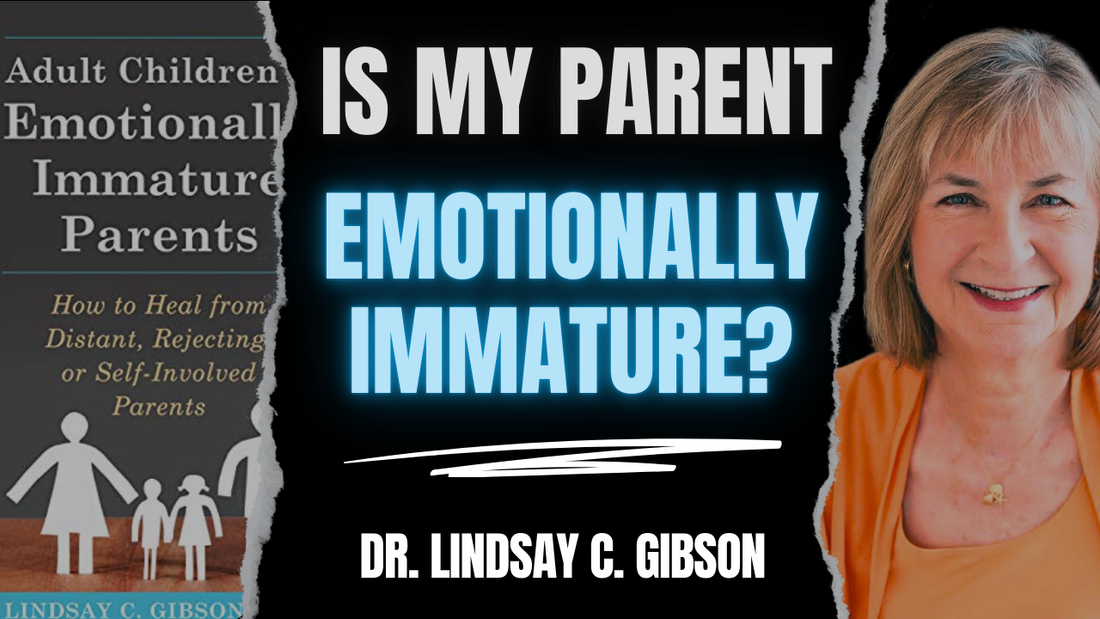
How Do I Know If My Parent Is Emotionally Immature?
Share
You know the feeling. You were only trying to share a piece of yourself with your parent—an experience you had, a pain that hasn’t gotten better, a memory from childhood where you needed more—but instead of understanding or empathy, all you got was defensiveness, dismissal, or being attacked.
Is my parent emotionally immature?
Dr. Lindsay C. Gibson, clinical psychologist and author of the New York Times Best Seller Adult Children of Emotionally Immature Parents, says that emotional immaturity in parents is not only more common than we admit, but incredibly damaging when it goes unrecognized.
The tricky part is that sometimes emotional immaturity doesn’t look like what you expect. It’s not always screaming and outright abuse. Sometimes it’s blank stares. Sometimes it’s silence. Sometimes it’s laughing off your pain or saying “I don’t remember that” when you finally find the courage to speak.
Here are some common signs of an emotionally immature parent:
1. They can’t handle disagreement without shutting down or lashing out
Even polite disagreement can trigger a major reaction. If you’ve ever tried to express a different perspective, especially about something they did, and been met with deflection, sarcasm, or silence, you may be dealing with emotional immaturity.
Emotionally immature people struggle to hold multiple truths. Their worldview is often black-and-white. They interpret disagreement as disloyalty—and that shuts down connection before it can begin.
2. They overreact to minor issues
Dr. Gibson says emotionally immature parents often react like children in adult bodies. Their responses are driven by internal panic, not emotional regulation. Something small—like being late, forgetting a call, or asking a hard question—can explode into accusations, guilt trips, or icy withdrawal.
As a child, this instability teaches you to manage your parent’s emotions through how you exist in the world. You learn to scan for danger, shrink your needs, and stay quiet to avoid setting them off.
3. They make your emotions about them
When you try to express how something hurt you, the conversation flips.
Suddenly it’s about them. How hard they had it. How much they’ve done for you. How ungrateful you are.
This reflex is common in emotionally immature parents. Instead of sitting with your pain, they get consumed by their own shame and deflect responsibility through blame, distraction, or denial.
4. They never sincerely apologize
Emotionally immature people can’t tolerate the vulnerability that requires.
Instead, they might say:
- “You’re too sensitive.”
- “That’s not how it happened.”
- “I was doing my best.”
- “You turned out fine, didn’t you?”
Dr. Gibson explains that this refusal to acknowledge your pain isn’t always intentional cruelty. It’s a defense mechanism. But the impact is still the same: it leaves you alone with your feelings and desperate for repair that never comes.
5. They can’t tolerate real emotional intimacy
This is the core. Emotionally immature parents are deeply threatened by emotional closeness. They want connection on their terms only, when it feels safe, easy, or superficial.
But when things get real, when the relationship demands accountability, empathy, or presence, they either shut down or attack. They simply don’t have the tools to love you in a way that makes you feel safe, seen, or understood. And the impact of that can stay with you for a lifetime.
So What Do You Do?
Recognizing emotional immaturity in your parent can stir up grief and guilt, but behind those feelings waits relief.
Here’s where to begin:
-
Stop explaining yourself to someone who’s not listening.
If they can’t take in your truth, protect it anyway. Speak it for you. -
Learn to reparent yourself.
Emotionally immature parents often leave behind unmet emotional needs—comfort, safety, validation. Healing means meeting those needs now, through supportive relationships and consistent self-care. -
Set boundaries that reflect reality, not hope.
If they’ve never responded well to confrontation, consider letter-writing, distance, or disengaging from the need for repair. -
Name what you missed.
Dr. Gibson emphasizes the power of clarity. You can’t change the past. But you can stop trying to convince yourself that it wasn’t as bad as it felt.
The important part is to know that you didn’t imagine it. You’re not being dramatic. You’re not “thinking too much.”
If your parent was emotionally immature, you learned to carry the weight of their limitations, as well the pain of never having your own needs met.
But now you get to put that weight down and figure out what it means to be seen and loved in full, starting with yourself.
What to Do Next
If this article put words to something you’ve felt but couldn’t name theHealing From Emotionally Immature Parents Course was designed just for you.
The goal isn’t to blame your parents. It’s to see your childhood for what it was so you can finally become who you were always meant to be.
